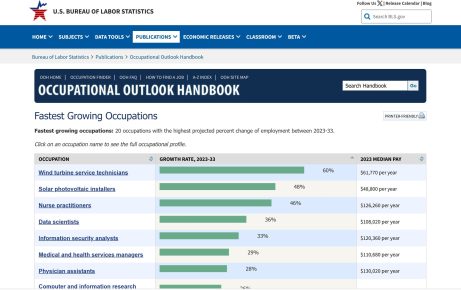Fastest Growing Careers/Majors
Careers/College Majors in Most Demand
The demand for different college majors can vary widely depending on factors such as industry, job market trends, geographic location, and social and technology trends. While there is no guarantee that choosing a specific major will lead to high earnings, certain fields have consistently tended to offer more opportunities than others.
Resources:
The US Bureau of Labor Statistics tracks careers with the most demand.
Click here to view Fastest Growing Occupations from BLS.
Click here to view BLS Career Outlook
Careers of the Future Resources
LinkedIn 2025 Jobs on the Rise List.
Lightcast - Lightcast is a global leader in labor market analytics connecting people with jobs by providing businesses, communities, and education institutions with the best labor market data possible. There data-driven insight enables better, faster decisions.
Pew Research
New America
Jobs for the Future
McKinsey
Here are some college majors that are often associated with higher employer demand:
- Engineering: Engineering majors, such as Petroleum Engineering, Chemical Engineering, Electrical Engineering, and Computer Engineering, often command high salaries due to their technical expertise and demand in industries like energy, technology, and manufacturing.
- Computer Science: Computer Science majors are in high demand in the technology sector, with roles such as software developer, data scientist, and cybersecurity analyst offering competitive salaries.
- Business Administration and Management: Majors in fields like Finance, Accounting, Marketing, and Management can lead to lucrative careers in finance, consulting, corporate leadership, and entrepreneurship.
- Healthcare and Medicine: Majors such as Nursing, Pharmacy, Physician Assistant Studies, and Biomedical Engineering are associated with high-paying careers in healthcare, particularly as demand for healthcare professionals continues to grow.
- Information Technology: Majors in Information Technology, Information Systems, and Computer Information Systems can lead to well-paying roles in areas such as IT management, network administration, and database administration.
- Economics and Finance: Majors in Economics, Finance, and Actuarial Science can lead to lucrative careers in banking, investment management, insurance, and financial analysis.
- Mathematics and Statistics: Majors in Mathematics, Statistics, and Actuarial Science can lead to high-paying roles in fields such as data analysis, risk management, and quantitative finance.
- Petroleum Geology and Mining Engineering: Majors in Petroleum Geology and Mining Engineering can lead to lucrative careers in the energy and natural resources sectors.
It's important to note that while these majors are often associated with higher potential demand, opportunities can vary based on factors such as job experience, geographic location, industry specialization, and negotiation skills. Additionally, pursuing a major solely for its potential to generate income may not lead to long-term satisfaction if it does not align with your interests, values, and career objectives. It's essential to choose a major that both interests you and offers opportunities for professional growth and fulfillment.
What College Majors will be Most Impacted by Artificial Intelligence?
The impact of artificial intelligence (AI) on college majors is multifaceted and dynamic. While AI is likely to influence virtually all fields of study in some way, certain majors may experience more significant changes due to advancements in AI technology. Here are some college majors that are likely to be affected by AI:
- Computer Science and Engineering: AI is a core component of computer science and engineering disciplines. Majors in these fields will likely see increasing emphasis on AI-related coursework, such as machine learning, robotics, natural language processing, and computer vision.
- Data Science and Analytics: With the proliferation of AI-driven technologies, the demand for professionals skilled in data analysis, predictive modeling, and machine learning is growing rapidly. Data science and analytics majors will need to stay abreast of AI developments to remain competitive in the job market.
- Information Technology: AI is transforming the way information systems are designed, managed, and utilized. Majors in information technology may incorporate AI-focused courses to prepare students for roles in AI-driven software development, cybersecurity, and network optimization.
- Business and Management: AI has the potential to revolutionize various aspects of business operations, including decision-making, marketing, finance, and supply chain management. Majors in business and management may need to develop skills in AI strategy, data-driven decision-making, and managing AI-driven teams.
- Healthcare and Medicine: AI technologies such as machine learning algorithms, natural language processing, and computer vision are increasingly being used in healthcare for tasks like medical imaging analysis, drug discovery, patient diagnosis, and personalized treatment planning. Majors in healthcare and medicine may need to incorporate AI-related coursework to stay current with technological advancements.
- Psychology and Behavioral Sciences: AI is being used to analyze large datasets of human behavior, predict psychological outcomes, and develop personalized interventions. Majors in psychology and behavioral sciences may need to learn about the ethical implications of AI in areas such as privacy, bias, and human-AI interaction.
- Environmental Science and Sustainability: AI has the potential to enhance environmental monitoring, resource management, and climate modeling. Majors in environmental science and sustainability may need to incorporate AI-related coursework to leverage AI technologies for environmental conservation and sustainability efforts.
These are just a few examples, and the impact of AI will likely extend to many other fields of study as well. Regardless of the specific major, students may benefit from gaining foundational knowledge in AI concepts and technologies to adapt to the changing landscape of their respective industries.
